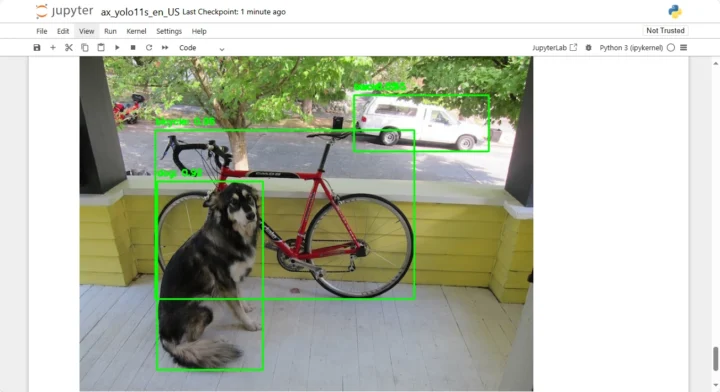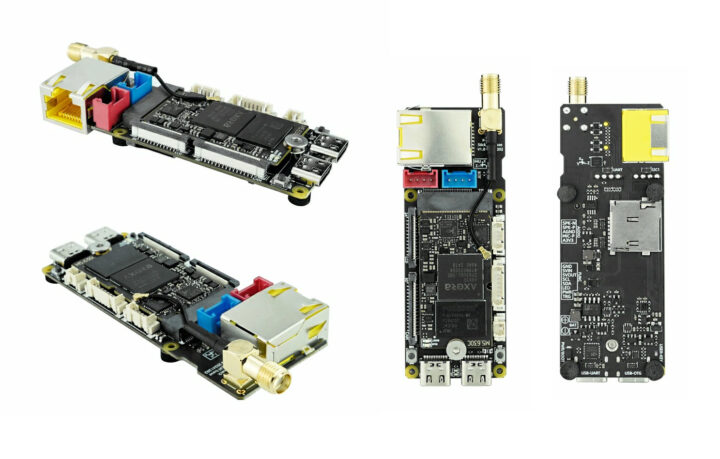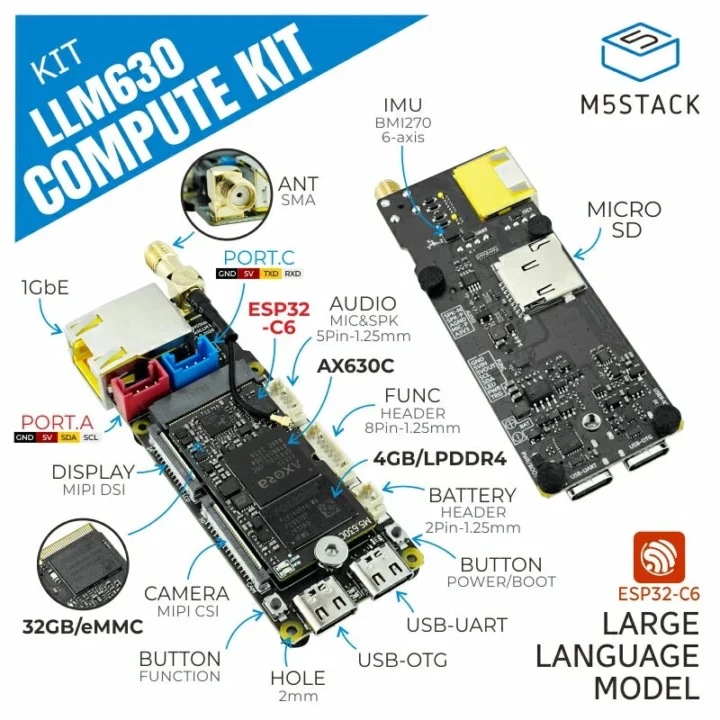M5Stack LLM630 Compute Kit is an Edge AI development platform powered by Axera Tech AX630C AI SoC with a 3.2 TOPS NPU designed to run computer vision (CV) and large language model (LLM) tasks at the edge, in other words, on the device itself without access to the cloud.
The LLM630 Compute Kit is also equipped with 4GB LPDDR4 and 32GB eMMC flash and supports both wired and wireless connectivity thanks to a JL2101-N040C Gigabit Ethernet chip and an ESP32-C6 module for 2.4GHz WiFi 6 connectivity. You can also connect a display and a camera through MIPI DSI and CSI connectors.
M5Stack LLM630 Compute Kit specifications:
- SoC – Axera Tech (Aixin in China) AX630C
- CPU – Dual-core Arm Cortex-A53 @ 1.2 GHz; 32KB I-Cache, 32KB D-Cache, 256KB L2 Cache
- NPU – 12.8 TOPS @ INT4 (max), 3.2 TOPS @ INT8
- ISP – 4K @ 30fps
- Video – Encoding: 4K; Decoding:1080p @60fps, H.264 only
- System memory – 4GB LPDDR4 (2GB system memory + 2GB dedicated for hardware acceleration)
- Storage
- 32GB eMMC 5.1 flash
- MicroSD card slot
- Display Interface – 2-lane MIPI DSI connector up to 1080p @ 30fps
- Camera Interface – 4-lane MIPI CSI connector up to 4K @ 30fps @ 1.25mm
- Audio – 5-pin microphone and speaker header
- Networking
- Low-profile Gigabit Ethernet RJ45 port (JL2101B-N040C)
- 2.4GHz WiFi 6 via ESP32-C6 SoC and SMA antenna
- USB – 1x USB 2.0 OTG Type-C port
- Sensor – 6-axis BMI270 motion sensor
- Expansion
- 4-pin 2.0mm PORTA Grove connetcor (I2C)
- 4-pin 2.0mm PORTC Grove connetcor (UART)
- 8-pin 1.25mm pitch FUNC header (system wake, power management, external LED control, I2C, etc.)
- Debugging/Programming – USB-C to UART via CH9102F USB to TTL chip
- Misc – 2x buttons for power on/off, user interaction, reset and other functions
- Power Supply
- 5V/2A via USB-C port
- 1.25mm connector for 3.7V Li-ion or Li-polymer battery
- Battery Management – AW32001ECSR charging chip, BQ27220YZFR battery detection chip
- Dimensions – 90.3 x 31.6 x 12mm
- Weight – 22.9 grams
- Temperature Range – 0°C – 40°C
The LLM630 Compute Kit ships with a 2.4GHz WiFi antenna, a heatsink, and four EVA foam foot pads. It targets a range of Edge AI applications in various sectors such as Smart Homes, security monitoring, Smart Retail, Smart Agriculture, interactive robotics, and STEM education.
Like the earlier M5Stack Module LLM based on the same AX630C AI SoC, the LLM630 Compute Kit is supported by the StackFlow AI framework which integrates AI algorithms such as speech, vision, and large language models, as well as Jupyter Notebook to facilitate learning and development. It runs an Ubuntu 22.04 image and LLM and computer vision models can be installed using .deb packages. Further technical details and instructions to get started with the software can be found on the documentation website.

As noted in our article about the Module LLM, the Axera AX630C compares favorably to the Jetson Orin Nano (10W power mode) with a similar performance in models such as Inception v1, MobileNet v1, or Yolov3s, but at a much lower price point. The platform also supports a range of Qwen2.5-0.5/1.5B and Llama3.2-1B large language models. It could also provide a low-cost, more compact alternative to solutions with Raspberry Pi 5 + Hailo-8 AI accelerator or Rockchip RK3588 SBCs depending on your requirements. Compared to the Module LLM, the LLM630 Compute Kit is a standalone solution with integrated Ethernet and WiFi support and extra I/Os, and does not require any of M5Stack’s Core modules.
M5Stack sells the LLM630 Compute Kit on AliExpress for $69.99 as well as on the company’s store for the same price. The product is shown as out of stock because the company is taking a break for the Chinese New Year between January 21 and February 4. It might also eventually show up on M5Stack’s Amazon store.
#M5StackNew The LLM630 Compute Kit is an #AI large language model (#LLM) inference development kit, powered by the #Axera #AX630C SoC with a 3.2 TOPs NPU, it delivers efficient AI inference for tasks like computer vision (CV) and LLM processing. pic.twitter.com/sHdESYydoC
— M5Stack (@M5Stack) January 17, 2025

Jean-Luc started CNX Software in 2010 as a part-time endeavor, before quitting his job as a software engineering manager, and starting to write daily news, and reviews full time later in 2011.
Support CNX Software! Donate via cryptocurrencies, become a Patron on Patreon, or purchase goods on Amazon or Aliexpress






